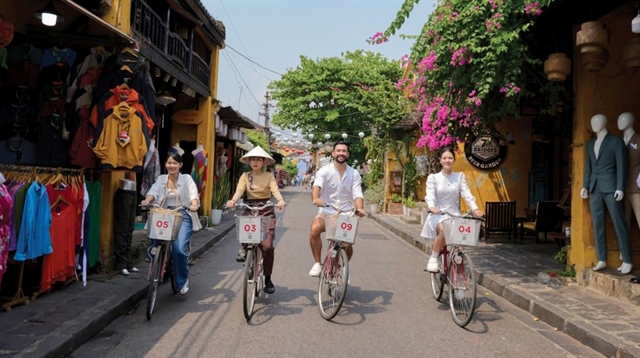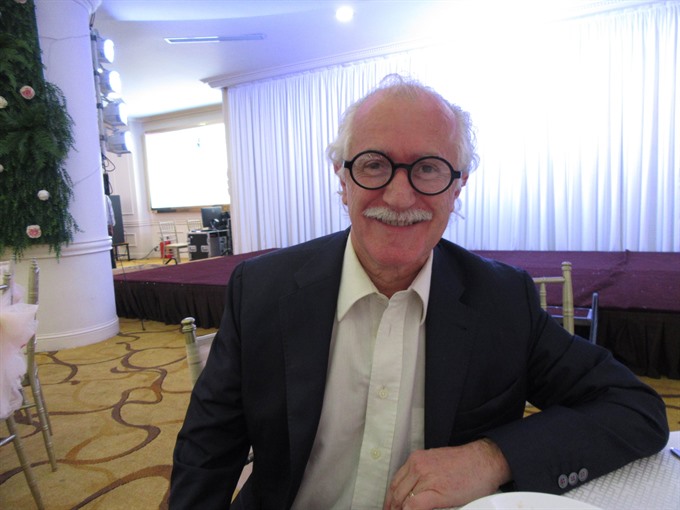 Life & Style
Life & Style

Alain Destandau, director of the Monte-Charge Theatre in Southern France, and a jury member of the International Experimental Theatre Festival 2016 shares with Bạch Liên his impressions about the festival, and about Việt Nam’s theatre.
 |
| Judge and jury: French theatre director Alain Destandau. — VNS Photo Bạch Liên |
The International Experimental Theatre Festival 2016, featuring eight troupes from China, the Philippines, Japan, Greece, Germany, Panama, France, and Việt Nam, has ended in Hà Nội.
Alain Destandau, director of the Monte-Charge Theatre in southern France, a jury member, shared with Bạch Liên his impressions about the festival, and about Vietnamese theatre.
Sixteen plays were performed in the festival. As a jury member, what do you think of their quality?
I had the great pleasure of watching all the plays this time. I was in Ha Noi ten years ago for the second International Experimental Theatre Festival, when my play Cercles de Sable (Sand Circles) – a combination of French masked theatre art with Việt Nam’s tuồng (classical opera) theatre – was performed. I was able to watch several plays during the second festival. But this year, I saw a great improvement in the quality of the plays performed by both Vietnamese and foreign artists.
Can you elaborate on the improvements you saw?
A main difference this year was the décor, which was much simpler, but very aesthetic.
Let’s take as an example the play This Ship Will Not Float Forever by the troupe from Panama.
I am sure that 10 years ago, we should have seen a cardboard cutout of a ship on the stage. But now, with his imagination, the director had the actors “make” the ship. And this is very experimental.
With the actors’ movements, we could see the ship getting wrecked. These are small ideas but they show the intellectual approaches of the theatre director when he looks for something which is experimental.
Ten years ago, I think that the theatre directors would not have imagined that they could make a boat with actors.
I was also very impressed with the play Medea (ancient Greek tragedy written by Euripides), which was performed by a troupe from HCM City. There was no décor on the stage. There were just eight cajon drums making sounds during different scenes. They were also used as the seats on which the actors sat. The actors wore colourful sheets to invoke ancient Greek characters. They stood up, performed and later returned to sit down on the seats. The decor was very pure and symbolic. And it was very good.
So you see progress in Vietnamese theatre as well?
Yes, ten years ago, Vietnamese theatre showed actual things; now it symbolizes them much more. I find this very interesting.
At the festival this year, I was also impressed to see some Vietnamese actors do very well. The actor who plays the character Claudius in Hamlet was very natural. He was very good. I also saw the Vietnamese actress who plays Medea. She is very talented. I see that a new door has opened for Vietnamese theatre.
I can say that the troupes from both Hà Nội and HCM City were much better than 10 years ago. Vietnamese theatre is really evolving.
With several good plays performed at the festival, was it difficult for you as a jury member?
No. As a member of the jury, I try to be as honest and objective as possible.
It is an experimental theatre festival. So, the priority for me, it is not to know which play I prefer as a member of the audience, but to see which play has been most experimental to present something really new.
There are several plays that I find excellent. They are spectacular. They have been performed for several years, and enjoyed great success among the public. But they do not carry much experimental value. Therefore, at this festival, my appreciation was more for the plays that might have had less public success, but were more creative, more experimental.
Over the last ten years, you’ve successfully collaborated with Vietamese tuồng artists with two plays Cercles de Sable and Antigone. Do you have a new project with them?
Yes, we hope that our third play Seasons of Rice will soon be performed in Việt Nam. I wrote the script and it is directed by Bétina Schneeberger.
The play tells four different stories that happen in a Vietnamese village through the four seasons of rice farming. We will touch on a variety of themes: the strength of belief, the choices of the people, faithfulness to our sentiments, sacrifice, honour, fear, departure, meetings and the choices we make every day in our life while trying not to betray the principles we have always wanted to follow: firmness and loyalty.
It has been ten years that we’ve lived this beautiful adventure with Vietnamese tuồng actors.
We do not speak the same language but we understand each other. When they perform in France, they live in our house and we cook, eat and spend good moments together. We are like a family. We are happy to be on the stage together. We do not lose our culture but we share it with each other and enrich ourselves with our cultures. — VNS